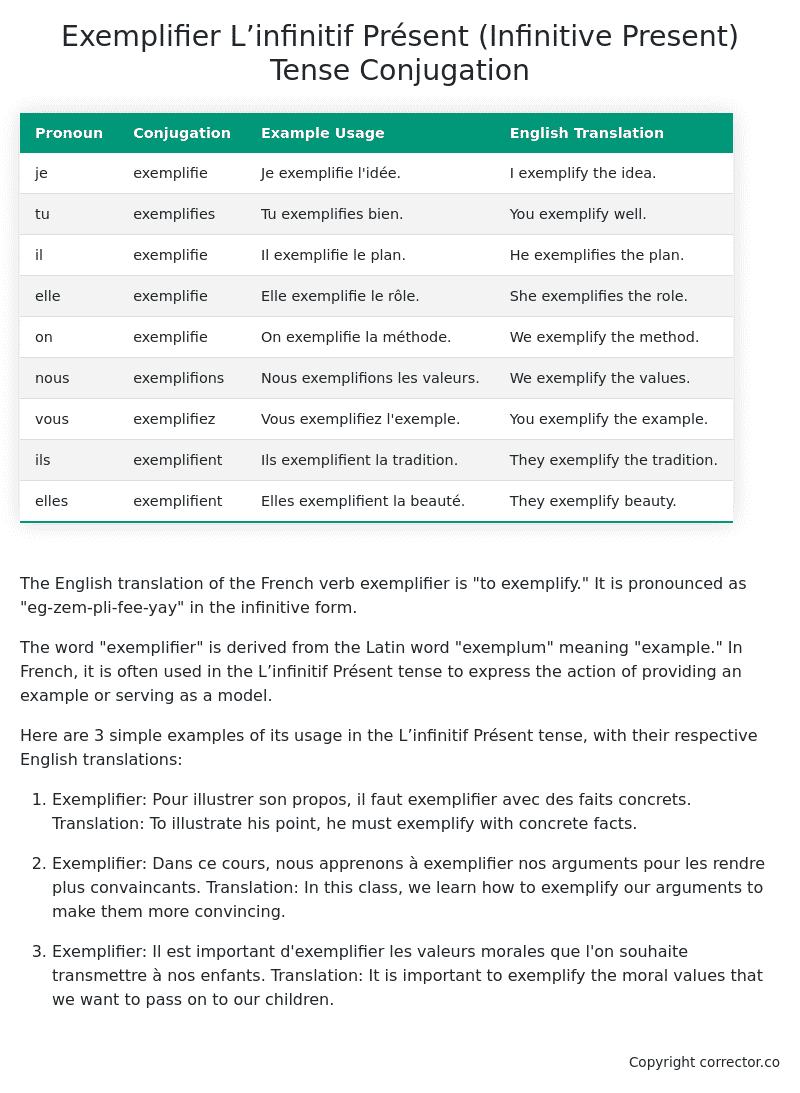L’infinitif Présent (Infinitive Present) Tense Conjugation of the French Verb exemplifier
Introduction to the verb exemplifier
The English translation of the French verb exemplifier is “to exemplify.” It is pronounced as “eg-zem-pli-fee-yay” in the infinitive form.
The word “exemplifier” is derived from the Latin word “exemplum” meaning “example.” In French, it is often used in the L’infinitif Présent tense to express the action of providing an example or serving as a model.
Here are 3 simple examples of its usage in the L’infinitif Présent tense, with their respective English translations:
-
Exemplifier: Pour illustrer son propos, il faut exemplifier avec des faits concrets.
Translation: To illustrate his point, he must exemplify with concrete facts. -
Exemplifier: Dans ce cours, nous apprenons à exemplifier nos arguments pour les rendre plus convaincants.
Translation: In this class, we learn how to exemplify our arguments to make them more convincing. -
Exemplifier: Il est important d’exemplifier les valeurs morales que l’on souhaite transmettre à nos enfants.
Translation: It is important to exemplify the moral values that we want to pass on to our children.
Table of the L’infinitif Présent (Infinitive Present) Tense Conjugation of exemplifier
| Pronoun | Conjugation | Example Usage | English Translation |
|---|---|---|---|
| je | exemplifie | Je exemplifie l’idée. | I exemplify the idea. |
| tu | exemplifies | Tu exemplifies bien. | You exemplify well. |
| il | exemplifie | Il exemplifie le plan. | He exemplifies the plan. |
| elle | exemplifie | Elle exemplifie le rôle. | She exemplifies the role. |
| on | exemplifie | On exemplifie la méthode. | We exemplify the method. |
| nous | exemplifions | Nous exemplifions les valeurs. | We exemplify the values. |
| vous | exemplifiez | Vous exemplifiez l’exemple. | You exemplify the example. |
| ils | exemplifient | Ils exemplifient la tradition. | They exemplify the tradition. |
| elles | exemplifient | Elles exemplifient la beauté. | They exemplify beauty. |
Other Conjugations for Exemplifier.
Le Present (Present Tense) Conjugation of the French Verb exemplifier
Imparfait (Imperfect) Tense Conjugation of the French Verb exemplifier
Passé Simple (Simple Past) Tense Conjugation of the French Verb exemplifier
Passé Composé (Present Perfect) Tense Conjugation of the French Verb exemplifier
Futur Simple (Simple Future) Tense Conjugation of the French Verb exemplifier
Futur Proche (Near Future) Tense Conjugation of the French Verb exemplifier
Plus-que-parfait (Pluperfect) Tense Conjugation of the French Verb exemplifier
Passé Antérieur (Past Anterior) Tense Conjugation of the French Verb exemplifier
Futur Antérieur (Future Anterior) Tense Conjugation of the French Verb exemplifier
Subjonctif Présent (Subjunctive Present) Tense Conjugation of the French Verb exemplifier
Subjonctif Passé (Subjunctive Past) Tense Conjugation of the French Verb exemplifier
Subjonctif Imparfait (Subjunctive Imperfect) Tense Conjugation of the French Verb exemplifier
Conditionnel Présent (Conditional Present) Tense Conjugation of the French Verb exemplifier
Conditionnel Passé (Conditional Past) Tense Conjugation of the French Verb exemplifier
L’impératif Présent (Imperative Present) Tense Conjugation of the French Verb exemplifier
L’infinitif Présent (Infinitive Present) Tense Conjugation of the French Verb exemplifier (this article)
Struggling with French verbs or the language in general? Why not use our free French Grammar Checker – no registration required!
Get a FREE Download Study Sheet of this Conjugation 🔥
Simply right click the image below, click “save image” and get your free reference for the exemplifier L’infinitif Présent tense conjugation!

Exemplifier – About the French L’infinitif Présent (Infinitive Present) Tense
Forming the Infinitive Present
Common Everyday Usage Patterns
As a Verb’s Dictionary Form
After Modal Verbs
As an Imperative
In Infinitive Clauses
Interactions with Other Tenses
Present Tense
Future Tense
Conditional Tense
Passé Composé
Imperfect Tense
Subjunctive and Conditional Moods
Summary
Want More?
I hope you enjoyed this article on the verb exemplifier. Still in a learning mood? Check out another TOTALLY random French verb conjugation!


